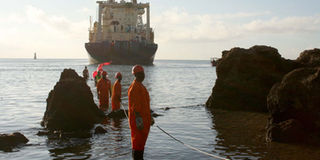Internet capacity to double soon after fifth fibre optic cable lands

PHOTO | FILE Engineers pull the EASSy cable from a ship that docked at Fort Jesus on March 22, 2010. A fifth undersea fibre optic cable is set to land in Kenya, doubling the country’s Internet capacity.
What you need to know:
- Information and Communication Permanent Secretary Bitange Ndemo on Monday said that a Middle Eastern company was currently contracting suppliers to lay the undersea cable
- According to the PS, the increased network capacity will be in line with rising local demands for high speed data
- Dr Ndemo also revealed that a project to provide every Internet users with digital identities would be implemented in a bid to combat rising cyber crime
A fifth undersea fibre optic cable is set to land in Kenya, doubling the country’s Internet capacity.
Information and Communication Permanent Secretary Bitange Ndemo on Monday said that a Middle Eastern company was currently contracting suppliers to lay the undersea cable.
Once the fifth cable is laid, Kenya’s bandwidth capacity will double to more than 15 terabytes per second (TBps).
Currently, Kenya’s four undersea cables cumulatively provide the country with a capacity of about 8.56 TBps.
According to the PS, the increased network capacity will be in line with rising local demands for high speed data. (Read: Optic cables give Kenya a boost in web access)
“The capacity we have will be used up in the next five years. We will have high demand as we move to digitise schools and hospitals,” he told journalists.
However, it is not yet clear whether increased data capacity will translate to lower consumer prices.
Expectations that Internet prices would fall by at least 90 per cent following the 2009 landing of The East African Marine Cable System (TEAMS) are yet to be met.
Industry players have blamed the high prices on competition by inland cable providers that has been accompanied by heavy infrastructure investments. (Read: Silent fibre-optic war rages)
Further, Kenya’s usage of the capacity is yet to reach the critical mass that would directly precipitate lower prices — currently, the country only uses 6 per cent of its bandwidth capacity.
Frequent cuts
Kenya’s undersea fibre connection has been threatened by frequent cuts that have left sections of the country in an Internet blackout.
Dr Ndemo said the government is in talks with the Middle Eastern investor to find an alternative landing point in Mombasa, creating a redundancy for the other cables.
“We don’t want them to land at the same place as the other four cables. If they land elsewhere, it provides a backup,” he said.
The Permanent Secretary also the government was planning to construct two level four data centres within the planned Konza technopolis.
The centres will be funded through Public Private Partnerships (PPPs).
Dr Ndemo was speaking on the sidelines of an ICT conference hosted by audit firm Deloitte.
The forum brought together industry stakeholders to start a process of reviewing Kenya’s existing ICT policies with a view of increasing employment opportunities, access to technology and bridging the digital divide.
Earlier in the day, Dr Ndemo revealed that a project to provide every Internet users with digital identities would be implemented in a bid to combat rising cyber crime.
At a press briefing ahead of the East Africa Cyber Security Convention, Dr Ndemo noted that improving cyber security and combating rising Internet crime was crucial to developing Kenya as a technology hub in the region.




